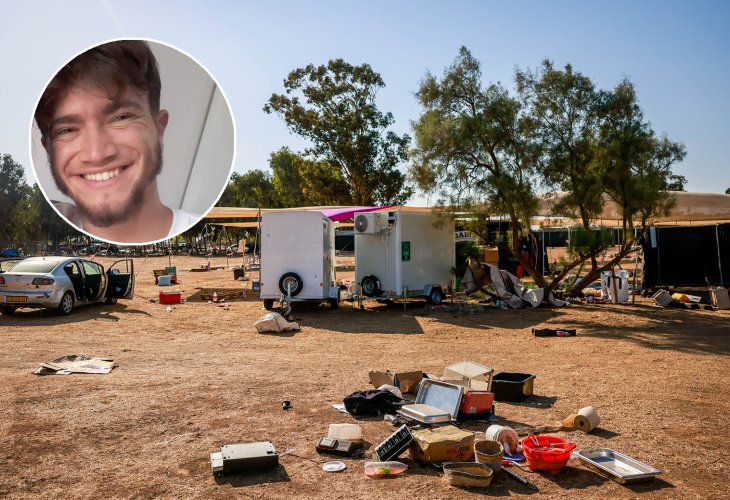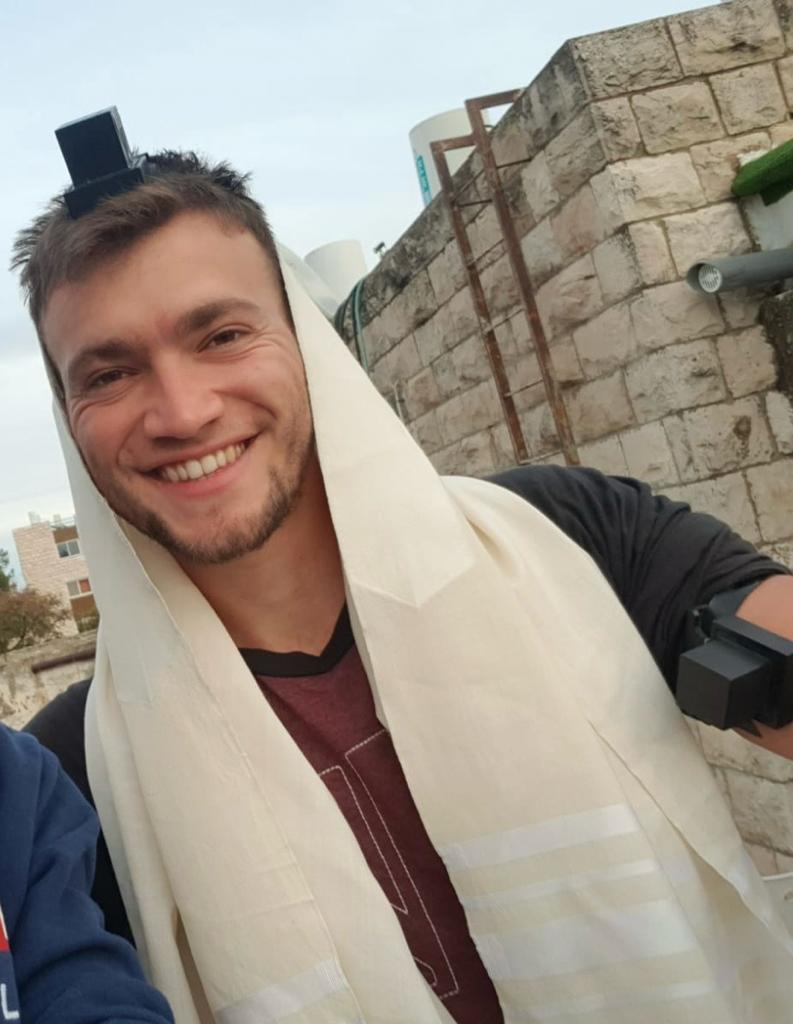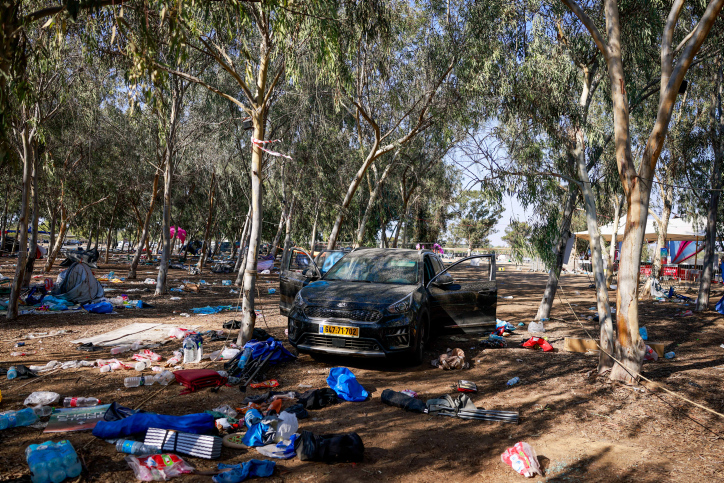Personal Stories
“A Lion of Light”: The Life, Faith, and Legacy of Yehuda, Murdered at the Simchat Torah Massacre
The story of a young man whose authenticity, gratitude, and love for people continue to inspire thousands after his death
 (Photo: Chaim Goldberg / Flash 90)
(Photo: Chaim Goldberg / Flash 90)As the Simchat Torah holiday came to an end, Naama Feibelson and Michal Bachar heard — like the rest of the country, about the horrific disaster that had taken place in southern Israel. What they did not know, not even for a moment, was that their beloved brother Yehuda had been there.
Five days later, the worst possible news was confirmed: Yehuda had been shot by terrorists and murdered, together with another friend.
“We had no idea he was going to the party,” Michal says. “He traveled north for a brit milah on Thursday, and at that point he hadn’t planned to go to the party at all. At the last minute he decided to go, so we didn’t even know he was there. Only after the holiday did our older brother, Oria, find out through someone who had been there and recognized him. All the searches for him led nowhere, and he wasn’t answering his phone. We went through an unbearably hard week until we finally learned the truth.”
Yehuda was 24 years old when he was murdered. He was the fifth of seven siblings and is described by his sisters as an especially beloved brother. He grew up in a Haredi home to parents who had returned to religious observance before he was born and later divorced a few years ago. Both parents currently live in Beitar Illit. Naama is five years older than Yehuda, and Michal is two years younger.
As they speak about him, their trembling voices reveal not only grief, but shock that has not yet turned into full comprehension that Yehuda is truly gone.
A Truth-Seeker from a Young Age
Already as a teenager, Yehuda was described by his sisters as deeply authentic, someone devoted to an independent and personal inner search.
“As a teenager, Yehuda studied in a small yeshiva, but had difficulty surviving within formal frameworks and eventually left,” Naama explains. “After leaving yeshiva, he connected to a youth advancement program, took a computer course, and worked for a period at the Ministry of Interior in a stable job with a good salary — something many people would dream of. He loved life, was energetic, loved to run, jump, and talk to people.
“At some point, he felt he wasn’t fulfilling himself and wasn’t connecting to the role, so he left despite the comfort. He always aspired to be independent and to step out of the rat race of salaried work. Eventually, he opened his own business installing security cameras. In the last period, he lived with our father in Beit Shemesh, and they had a very special bond.”
A Spiritual Connection That Never Broke
Alongside his professional path, Yehuda was constantly engaged in spiritual growth.
“Even after he left yeshiva, he never left his connection to God,” Naama says. “He always wore a kippah and lived with faith. Every Shabbat he loved studying Shnayim Mikra Ve’Echad Targum, singing Shabbat songs, and learning Torah. Sometimes when it’s hard to keep mitzvot, people look for intellectual justifications for unanswered questions — but he wasn’t like that. Yehuda was deeply genuine and always remained connected.”
“Since His Murder, I’ve Learned to Give Thanks”
The confirmation of Yehuda’s death came only five days after the attack. During those days, the family was thrown into emotional turmoil — caught between hope that he might still be alive and signs that pointed to a far darker reality.
“On Monday that week, we received an audio recording from a woman who had been with him in the car, survived, and reached Shaare Zedek Hospital,” Naama recounts. “We desperately wanted to speak to her, but she was suffering from severe post-trauma and could barely talk. Eventually, Yehuda’s friends managed to get a recording in which she described that Yehuda was driving a friend’s car, with the three of them inside. At some point, they were shot at, and Yehuda was the first to be hit. She saw that he wasn’t moving, but didn’t know if he was dead. Then the second friend was shot. She hid in the back and covered herself with a sweater. Eventually, she escaped through a window, was kidnapped, and managed to escape again.
“Later, the police told us they had triangulated his phone and that it was some distance from the car. We hoped he had escaped and was hiding somewhere. We did everything we could to find him. My father even went down to the area, searching through bushes and calling out his name.
“At one point, a hospital called saying there was a young man who resembled his photo. My father and one of my brothers went to identify him — but it wasn’t Yehuda. On Wednesday, a social worker spoke to us and added clear details: he had been shot in the chest and hadn’t moved for two hours. That’s when we began to understand. On Thursday, we finally received official confirmation that he had been murdered. It took time — tragically, because there were hundreds of bodies to identify.”
The Last Memories
When asked about their last memories of Yehuda, Michal recalls: “On Tuesday of Chol HaMoed Sukkot, we celebrated a brit for a new baby in the family. I barely spoke with him — he had just returned from Uman. He described a powerful spiritual experience, spoke about Rabbi Nachman and the parable of the turkey, and tried to influence my partner toward spirituality and depth. There was a kind of spiritual calm about him. It’s amazing that even though I was, on paper, more religious than him, he constantly had a deep desire to talk about spiritual matters.”
Naama adds: “I have many small, sweet memories from Sukkot, but the most meaningful one was on Yom Kippur eve. I was at my father’s house, cooking the pre-fast meal. Yehuda came to eat, and we talked. He always complimented my food and shared Torah insights — about how the evil inclination appears in different disguises each time and how he shakes it off. He really inspired me. I remember thinking how special he was.”
 Yehuda ז''ל
Yehuda ז''ל“A Lion of Light”
“He was extremely friendly and social,” Michal says. “A friend to everyone. He loved meeting people. Parties expressed his love for human connection, warmth, and closeness. He had joy and tremendous inner strength. His friends called him ‘A Lion of Light’, and he often compared himself to a lion because he felt he carried powerful energy.”
“He inspired others constantly, gave life advice, and was deeply positive. He received more tickets and fines than anyone in the family — and always said thank you. He taught others to do the same. He would always say: ‘It’s not about why this is happening to me — it’s about how I lift myself from it.’ He lived with gratitude and love for the Jewish people.
“On our last trip together, I noticed how he spoke with everyone he met — from a security guard to a cashier. He always saw the human being in front of him, connected to everyone, even small children. He listened at eye level and loved without limits.”
Living Gratitude as a Way of Life
“Posts and magnets of ‘Mizmor LeTodah’ were distributed in his memory, because he used to say it ten — sometimes fifteen times a day, thanking God for even the smallest things. It was extraordinary. There’s a well-known video of him standing in a beautiful landscape with friends, shouting to God: ‘Thank You for this abundance.’
“My eight-year-old daughter remembered that video just yesterday and talked about how Yehuda used to get excited and shout about the abundance. His ability to see the good in everything was astonishing — to focus on it, to be moved by it, never to take it for granted, and to search for it in every situation. I constantly take his message of gratitude with me — true to his name, Yehuda.
“To be honest, I used to think gratitude wasn’t something truly deep. But since his murder, it has become a huge message for me. Yehuda wasn’t naïve — there was something deeply rooted in him, a real connection to thanking God without doubt. Even when he was stranded at 2 a.m. in pouring rain, he got out of the car and shouted, ‘Thank You, God, for the abundance.’ I try to learn from him — to remember that gratitude is possible in every situation.”
 (Photo: Chaim Goldberg / Flash 90)
(Photo: Chaim Goldberg / Flash 90)Discoveries After His Death
During shiva, a Haredi man came in, crying. His name was Yehonatan. He told us he had been Yehuda’s chavruta (study partner) for five years. He sat with us for hours and told us about their extraordinary friendship.
“They learned Tractate Bava Kamma together, mostly at Yehonatan’s home in Geula. We had never heard about him before. He told us that once they went to a spring together, but when Yehonatan realized it was mixed, he felt uncomfortable. Yehuda didn’t give up — he found another spot and suggested they learn Talmud.
“People passed by in shock: a Haredi man and a sun-tanned guy in a tank top, learning passionately, oblivious to the world around them. It was a tremendous kiddush Hashem. Yehonatan was embarrassed at first, but Yehuda insisted — and simply immersed himself in learning. This happened in other places too — at the Kotel plaza, in Mahane Yehuda market. We hadn’t known this side of him. It was incredibly moving. It really teaches you never to judge — and how impossible it is to truly define what a Jew is.”
A Legacy That Continues
As the conversation draws to a close, the sisters pause. “It’s incredibly hard,” Naama says softly. “Each of us carries the pain differently. My father took it especially hard — he was very close to Yehuda. What comforts us is the kiddush Hashem Yehuda continues to make even after his death.
“A video of him singing ‘Elokai Neshama’ with all his heart spread around the world. Two young men came to my father with stacks of letters from Jews across the globe — many not religious at all, who wrote how the video brought them closer to themselves and to God. They said Yehuda fulfilled a powerful mission through his death. It’s something we still can’t fully grasp.”

